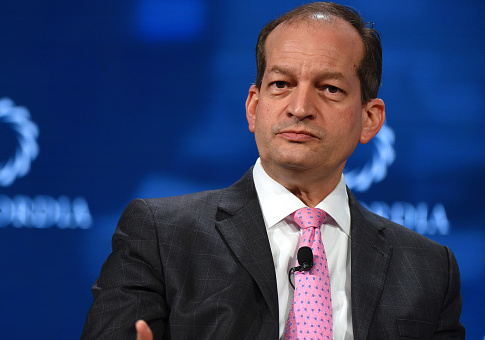The Trump administration is trying to help small businesses and the self-employed lower the costs of maintaining retirement benefits.
On Monday the Department of Labor issued a new proposal that would allow employers to pool 401(k) accounts through professional or regional associations. The aim is to cut relatively high fees from money managers overseeing smaller retirement accounts.
"This proposal seeks to level the playing field for employees in large firms and employees in small firms," one senior Labor Department official told the Washington Free Beacon.
A department analysis revealed that retirement accounts held by smaller employers paid nearly four times as much to their financial advisers than larger portfolios. The median small plan, which holds between $1 and $10 million in assets, generally pays 111 basis points—just over 1 percent—in fees. Larger employers holding $1 billion in retirement savings pay about 27 basis points. Officials hope that allowing these smaller employers to pool their money with neighboring businesses or industry competitors will slash the fees and boost workers' payouts when they retire.
"We're looking at a dramatic drop … in costs," a second senior official said, which will help workers at smaller firms "accumulate a larger nest egg over the life of their career."
The department announced the plan as part of President Trump's Aug. 31 executive order to expand retirement benefit access. Trump pointed to the disparity between large and small businesses in offering benefits. A slim majority of businesses with fewer than 100 workers offered benefits compared with about 90 percent of those with more than 100 employees.
"Federal agencies should revise or eliminate rules and regulations that impose unnecessary costs and burdens on businesses, especially small businesses, and that hinder formation of workplace retirement plans," the executive order said. "Enhancing workplace retirement plan coverage is critical to ensuring that American workers will be financially prepared to retire."
The Labor Department is using the same guidelines that allow smaller businesses to pool their assets for the purpose of offering health insurance to extend into the retirement market to "make it more attractive" to offer retirement benefits. While the department has yet to estimate how many more employers will begin offering 401(k)s as a result of the policy, it expects a drastic increase.
"It is hard to look at the landscape and not conclude that it's in the millions," the first official said.
The advantages of using the association model, according to agency officials, is that it allows small business owners to outsource to larger institutions the "administrative hassle" of maintaining a plan. The proposal would allow outside firms that already handle payroll and other benefits to also offer 401(k) services. This will remove a major hurdle for employers hesitant to engage in the retirement market and free them to concentrate on the day-to-day operation of their businesses.
"You probably didn't get into business to run a 401(k) plan, but it can feel like a full-time job," the first Labor official said. The outside firms "can take on that administrative burden."
Labor Secretary Alexander Acosta said this aspect of the proposal could play an even larger role in expanding workers' access to retirement benefits. While lower costs could prove a major boon to employers who already offer 401(k) benefits, getting rid of the man-hours associated with retirement gives those sitting out of the market a greater incentive to enter the market.
"Many small businesses would like to offer retirement benefits to their employees, but are discouraged by the cost and complexity of running their own plans," Acosta said in a statement. "Association Retirement Plans give these employers a simple and less burdensome way to offer valuable retirement benefits to their employees. The proposed rule helps working Americans—and their families—take care of themselves in their retirement years."
The proposal will now enter a 30-day public comment period.
